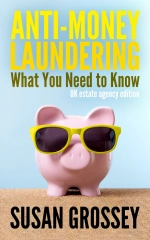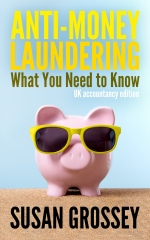Last week I went to a new gathering of people (oh, go on, you forced it out of me: I’ve joined the Women’s Institute) and when they asked what I do and I gave the potted description, several of them said, “Oh, so you’re part of the Paradise Papers”. Those exact words – and as with earlier incarnations (the Papers that were Panamanian), I simply nodded and said, ”Something like that”.
I am not going to write about the Paradise Papers themselves because, contrary to popular opinion, I am not part of them and I cannot shed any more light on them than that nice man from “Panorama”. What I have been disappointed by, however, is the official response to them. Every government whose jurisdiction has been named in the papers has said two things: “let’s concentrate on the real crime here – the hacking” and “at least we’re not as bad/complicit/corrupt as that jurisdiction over there [insert name as appropriate]”. Although I appreciate that politicians are concerned primarily with keeping their jobs, I find this short-term and un-cooperative stance depressing. Wouldn’t it be refreshing if someone said, yes, we’re a bit concerned about the manner in which the information has come to light, but we do encourage whistleblowing for the public good. And now that we know how widespread are these practices – to the detriment of all our public purses – let’s concentrate on how we can work together to harmonise our tax legislation and close the loopholes. After all, saying “we’re slightly less dreadful than our neighbours” is not really a glowing endorsement, is it? We’ve been through a similar process with AML, and thankfully – at least in the jurisdictions where I choose to work – the emphasis is now on improving global AML standards, rather than finding clever ways to get around them.





















It’s no secret that the art of deflection is part of a politician’s job description.
Indeed; it’s just disappointing. What a ghastly job it must be: unable to make your own decisions, and forced to wriggle when it goes wrong.
A reader in Jersey has kindly sent this link to a recent communique issued by the British Irish Council, reporting a meeting on 10 November 2017 at which ministers from Jersey, Ireland, the UK, Scotland, the Isle of Man and Guernsey confirmed their “shared commitment to meeting international standards and to working with the international community to tackle tax evasion and abusive tax avoidance”: https://www.britishirishcouncil.org/sites/default/files/Communique%20Jersey%20Summit.pdf
I am surprised that you pass over the stealing of the information which became the ‘Paradise Papers’ without comment. This was not a ‘leak’ or a whistle-blowing exercise it was a massive theft and publication of confidential information. It is hardly ‘news’ to anybody that high net worth individuals and large corporations structure their finances in such a way as to legally reduce their tax burden, whether it be Nike, Disney, the Queen, Lewis Hamilton or Bono. Indeed the only crime that came to light through this whole exercise is that theft and publication of information – which has been almost totally ignored.
Welcome to the blog, w smith, and thank you for your comment. I do not wish to give the impression that I regard the stealing of information as a small matter. As you say, what is alleged by Appleby is the theft of confidential information. However, I am careful not to jump the gun and say that it is an actual theft, as that charge has yet to be laid, let alone proven. Searching the Internet turns up hundreds of debates about whether this is a leak (i.e. with an insider) or a hack/theft, and I would rather not assume either until the experts – and indeed judges – have decided. What we do know – or at least, what I believe – is that the information that has been revealed shows that some surprising people are putting their money into surprising structures in surprising places.
If I told you my house was broken into and confidential information stolen, would you publish that information and say “oh, you say it’s stolen, but no-one has been charged or convicted”? I would hope not.
Hello w smith. Indeed – but I would also expect the police to ask whether, for instance, you had a bitter ex-wife with access to your house, who might have a particular interest in publishing that information.
We should also remember that this situation is very like that of the UK MPs’ expenses scandal. Initially the focus was how the information was obtained, but it soon became clear that greater public interest – in both senses of the term – was in what the information itself revealed. People soon decided – in that case – that they were more bothered about having dodgy MPs than they were about data theft. We have to recognise that repeating that the data was taken illegally does not mean that the data is false – and we will eventually have to answer for that data.
Very valid points on both sides of the discussion but just because it has not been proven as theft does not mean that it is by default, a leak – that unfortunately has other internal malicious and criminal connotations – which is equally unproven
You’re quite right, CDWOS – we shouldn’t jump to any conclusions either way.